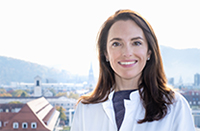New Medical Director at the Department of Pneumology

Expert for lung disease strives to translate scientific advances more quickly into improved therapies.
As of October 1, 2021, Prof. Dr. Daiana Stolz (47) has been appointed the new Medical Director of the Department of Pneumology at the Medical Center – University of Freiburg. She succeeds Prof. Dr. Joachim Müller-Quernheim, who had headed the clinic since 2002. Stolz studied human medicine at the Universidade Federal do Rio Grande do Sul in Porto Alegre, Brazil, and worked at the University Hospital Basel after stints at university hospitals in Germany, Switzerland and the USA, most recently as a senior physician in pulmonology. Stolz is an expert in inflammatory respiratory diseases such as COPD and asthma, respiratory infections, and interventional pulmonology.
“Lung diseases such as asthma and COPD are widespread diseases that affect around 16 million people in Germany alone. We are working on being able to offer these patients even more precise diagnoses and new therapies in the future,” says Stolz. With her research team, she is examining the effects of new substances on tissue samples taken from lung disease patients. “In the laboratory, we can use human cells to understand how the body reacts to certain therapies. In this way, new biomarkers can be identified with which we can predict the possible success of the treatment even better. This would enable us to detect lung diseases earlier and treat them more specifically."
After completing a Masters at the Harvard School of Public Health, Stolz set up her own research group at the University Hospital Basel as part of a professorship from the Swiss National Science Foundation. "To this day, I find it very satisfying to see how scientific advances are improving treatment options," says the pulmonologist. As a board member of the European Respiratory Society, she develops quality standards for the training and further education of lung specialists. In doing so, she always keeps an eye on the needs of the patients: "It’s only if those affected and those treating them work together that we can bring forward common goals such as prevention, rapid diagnostics and individualized treatment options," Stolz says with conviction.
Back